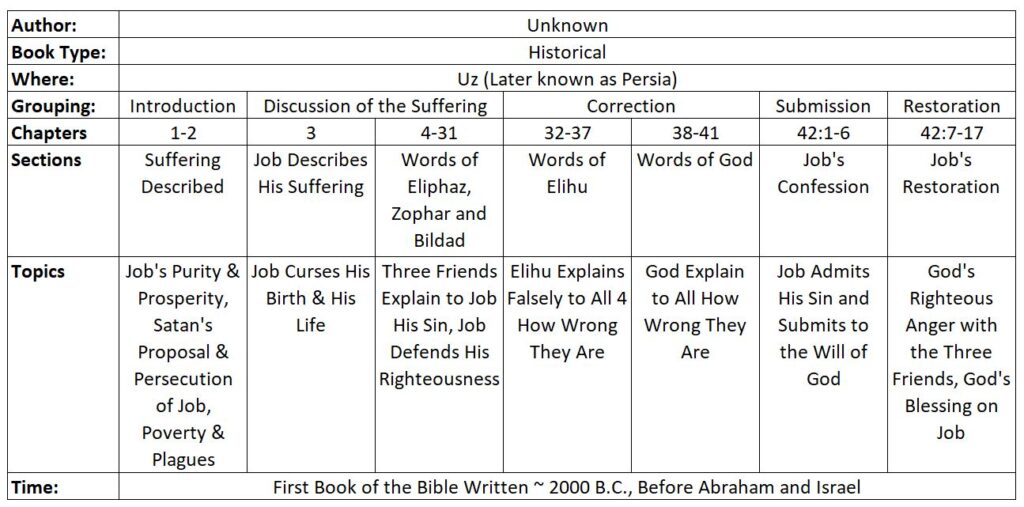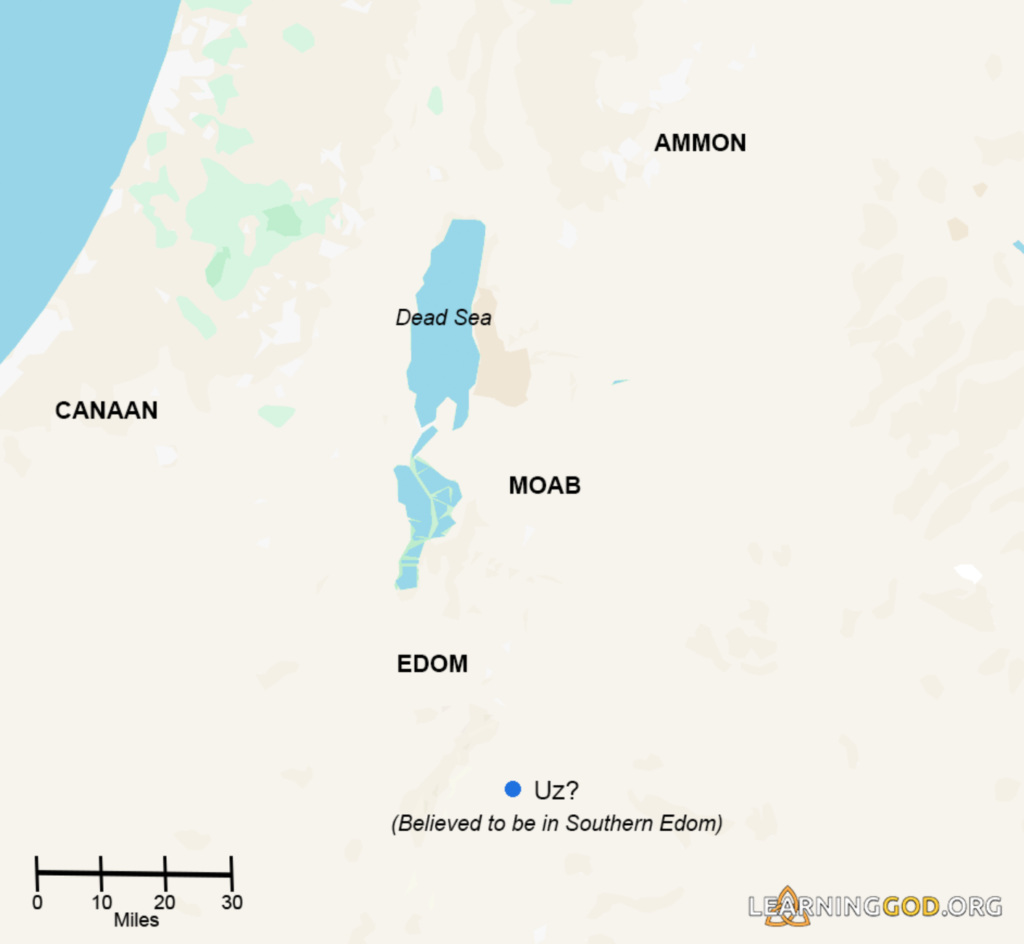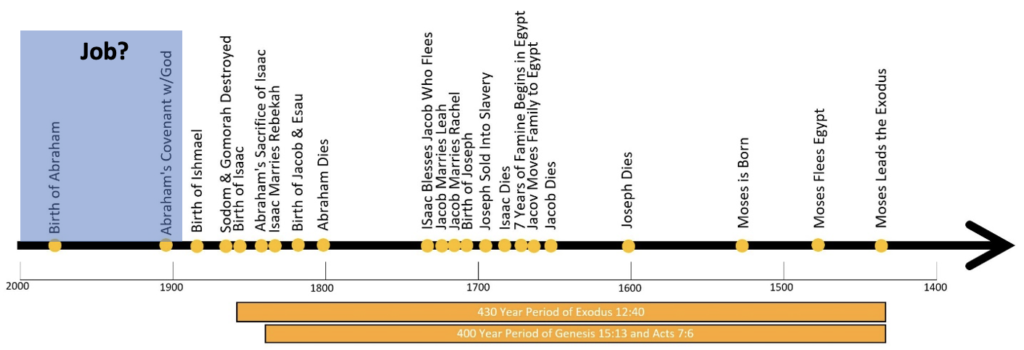Job
Faithfulness Through Suffering
Summary | About | Why You Should Read it | Author | When Written | Context | Timeline | Location | Outline | Observations | Resources
Summary
The Book of Job is a poetic and philosophical text from the Bible that explores profound questions about human suffering, divine justice, and the nature of faith. It is set in the land of Uz and centers on the character of Job, a righteous and wealthy man who experiences immense suffering when he loses his children, wealth, and health in a series of devastating events.
The narrative begins with a cosmic scene where God allows Satan to test Job’s faith by afflicting him, despite Job being blameless. Job’s friends—Eliphaz, Bildad, and Zophar—come to comfort him but instead argue that his suffering must be due to his own sin. Job defends his innocence and questions why the righteous suffer while the wicked prosper. He longs for answers from God, expressing deep anguish and frustration.
In the end, Job humbly accepts his lack of understanding, and God restores his fortunes, giving him more than he had before. The book concludes with Job’s faith vindicated, but the deep philosophical questions about suffering and divine justice remain open for reflection.
The following table provides a high-level look at the structure and contents of the book of Job.

About
Job is the 18th book of the Bible and the 1st book of Poetry in the Old Testament.

Why You Should Read It
Job offers several spiritual and philosophical insights that are applicable to our everyday lives, such as:
- Understanding Suffering and Faith: Job addresses one of the most difficult questions: why do good people suffer? For Christians, the book reinforces the idea that faith should not be contingent on circumstances. Job remains faithful even when he doesn’t understand why he suffers, illustrating the call to trust in God’s plan, even in the face of pain.
- God’s Sovereignty and Wisdom: The book emphasizes the vastness of God’s wisdom and the limits of human understanding. This is a humbling reminder for Christians that God’s purposes may be beyond their comprehension, yet His wisdom is perfect and trustworthy.
- Encouragement in Trials: Job’s perseverance through unimaginable hardship can inspire Christians to endure their own trials with faith. It reassures believers that even in suffering, God is present, and they can come to Him with their doubts, fears, and questions.
- Community and Friendship: Job’s friends offer well-meaning but misguided advice. This highlights the importance of compassion and wisdom when comforting others. Christians can learn the value of being supportive without assuming they know the reasons behind someone’s suffering.
- Hope and Restoration: Although Job goes through intense suffering, God ultimately restores him. This restoration serves as a symbol of hope for Christians, pointing to God’s ability to bring healing, blessing, and restoration after times of hardship.
- Foreshadowing Christ: Many Christians see Job as a figure who foreshadows Jesus, both in his innocence and in his suffering without cause. Just as Job’s faithfulness is rewarded, so too is Jesus’ suffering on the cross followed by resurrection and ultimate victory over sin and death.
In sum, reading Job offers Christians a deeper understanding of faith, trust in God’s sovereignty, and a framework for grappling with the reality of suffering in a broken world.
Author
The authorship of Job remains a mystery. There are conjectures among scholars that include names like Moses, Solomon, Elihu and even Job himself. Given this is the first story recorded in Bible chronology, it is unlikely we will ever know for sure who wrote it. Regardless, it offers many valuable insights for our everyday lives.
When Written
The answer to this depends on who the author is. The original recording was likely in the patriarchal time of 2000 to 1800 B.C. If Moses composed it, he likely took stories passed down from his fathers and recorded them in the 1400s B.C. If it was Solomon it would have been in the 900s B.C.
Given the lack of discussion regarding any aspect of the Mosaic Law, it is more likely it was written in the Patriarchal era, which is the conjecture of LearningGod.org.
Context
Assuming Job’s story is set in the patriarchal era (the time of Abraham, Isaac, and Jacob), the cultural context reflects a society that was largely pastoral, with wealth measured in livestock, servants, and land. During this period, religious ideas about God were still in development, and the focus was often on individual piety and direct encounters with the divine.
Job, as a non-Israelite from Uz, would have been part of a broader ancient Near Eastern culture, where suffering and divine justice were common themes in mythology and wisdom literature. Similar stories from neighboring cultures—such as the Babylonian Theodicy—deal with themes of human suffering, divine justice, and the relationship between gods and humans, providing a broader Near Eastern backdrop for Job’s themes.
Timeline
The timeline below shows from the birth of Abraham until the Temple. Job was in the time of the patriarchs, around the time of Abraham. Chronologically, it is the first book of the Bible outside of Genesis.
Location
Job lived in the land of Uz, which is believed to be in the area of Edom, southeast of what later became Israel.

Outline
| I. Prologue (chs. 1-2) |
| A. Job’s Happiness (1:1-5) |
| B. Job’s Testing (1:6;2:13) |
| 1. Satan’s first accusation (1:6-12) |
| 2. Job’s faith despite loss of family and property (1:13-22) |
| 3. Satan’s second accusation (2:1-6) |
| 4. Job’s faith during personal suffering (2:7-10) |
| 5. The coming of the three friends (2:11-13) |
| II. Dialogue-Dispute (chs. 3-27) |
| A. Job’s Opening Lament (ch. 3) |
| B. First Cycle of Speeches (chs. 4- 14) |
| 1. Eliphaz (chs. 4-5) |
| 2. Job’s reply (chs. 6-7) |
| 3. Bildad (ch. 8) |
| 4. Job’s reply (chs. 9-10) |
| 5. Zophar (ch. 11) |
| 6. Job’s reply (chs. 12-14) |
| C. Second Cycle of Speeches (chs. 15-21) |
| 1. Eliphaz (ch. 15) |
| 2. Job’s reply (chs. 16-17) |
| 3. Bildad (ch. 18) |
| 4. Job’s reply (ch. 19) |
| 5. Zophar (ch. 20) |
| 6. Job’s reply (ch. 21) |
| D. Third Cycle of Speeches (chs. 22-26) |
| 1. Eliphaz (ch. 22) |
| 2. Job’s reply (chs. 23-24) |
| 3. Bildad (ch. 25) |
| 4. Job’s reply (ch. 26) |
| E. Job’s Closing Discourse (ch. 27) |
| III. Interlude on Wisdom (ch. 28) |
| IV. Monologues (29:1;42:6) |
| A. Job’s Call for Vindication (chs. 29-31) |
| 1. His past honor and blessing (ch. 29) |
| 2. His present dishonor and suffering (ch. 30) |
| 3. His protestations of innocence and ^nal oath (ch. 31) |
| B. Elihu’s Speeches (chs. 32-37) |
| 1. Introduction (32:1-5) |
| 2. The speeches themselves (32:6;37:24) |
| a. First speech (32:6;33:33) |
| b. Second speech (ch. 34) |
| c. Third speech (ch. 35) |
| d. Fourth speech (chs. 36- 37) |
| C. Divine Discourses (38:1;42:6) |
| 1. God’s first discourse (38:1;40:2) |
| 2. Job’s response (40:3-5) |
| 3. God’s second discourse (40:6;41:34) |
| 4. Job’s repentance (42:1-6) |
| V. Epilogue (42:7-17) |
| A. God’s Verdict (42:7-9) |
| B. Job’s Restoration (42:10-17) |
Observations
- Many believe the Book of Job to be the earliest book of the Bible.
- Job is set during the times of the patriarchs.
- Factors to indicate a Patriarchal Age setting for Job:
- Job lived about 140 years after the events of this book took place (42:14). Therefore, his life span must have been around 200 years. Abraham lives 175 years.
- Job’s wealth is measured in terms of livestock (1:3; 42:12) rather than silver and gold.
- Like Abraham, Isaac, and Jacob, Job is the priest of his family and offers sacrifices.
- The social unit is the patriarchal clan.
- Job uses the characteristic patriarchal name for God, “Shaddai” (“the Almighty”).
- There is no reference to:
- Israel
- The exodus from Egypt
- The Mosaic Law
- The Tabernacle
- The Book of Job tells of a man who lost everything.
- His wealth
- His family
- His health
- Job wrestles with the great question, WHY?
- The land of Uz (1:1) is adjacent to the land of Midian where Moses lived for some 40 years.
- The Book of Job deals with:
- The question of the righteous having to suffer.
- The sovereignty of God over creation.
- Three of Job’s friends, Eilhu, Ephaz, and Zophar travel from nearby countries to visit with Job.
- “Though He slay me, yet will I trust Him. . . He also shall be my salvation.”
Job 13:15-16
Old Testament
New Testament
Free Resources
Other Resources
- x

